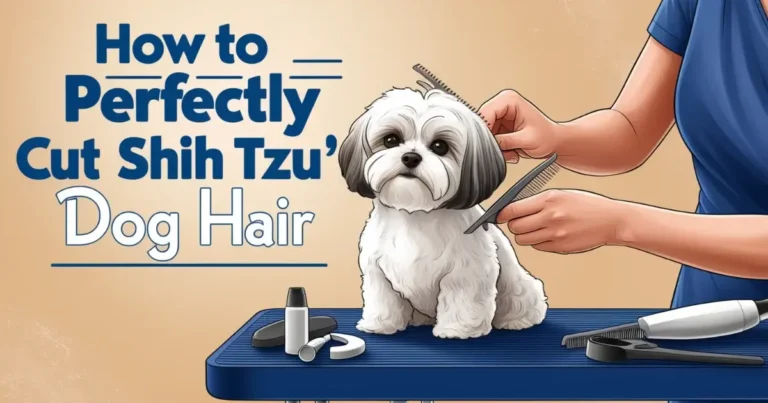How Long Can a Shih Tzu Go Without Eating? Guide for Healthy Pup
Shih Tzus are lively dogs that need proper nutrition to stay healthy. If your Shih Tzu stops eating, it can raise serious concerns. Knowing how long can a Shih Tzu go without eating and how to address this situation is crucial. Here’s what you need to know to protect their health.
Table of Contents
Understanding a Shih Tzu’s Nutritional Needs
Why Diet is Crucial for Shih Tzus
Shih Tzus burn energy quickly due to their small size and active nature. A proper diet keeps them energetic, supports organ function, and strengthens their immunity. Without regular meals, their health can decline rapidly.

How Long Can a Shih Tzu Survive Without Food?
A healthy Shih Tzu can survive for 3 to 5 days without food, but this is not safe. Beyond two days, the risk of malnutrition and organ damage increases significantly. If your dog refuses food for more than 24 hours, seek veterinary advice.
How Water Intake Affects Survival
Hydration is vital. Shih Tzus can survive only 1 to 2 days without water before dehydration sets in. Watch for dry gums, lethargy, or sunken eyes as signs of dehydration. Always ensure they have access to fresh water.
Common Reasons Shih Tzus Stop Eating
Health-Related Issues
- Dental pain: Gum disease or toothaches can make chewing painful.
- Digestive issues: Constipation, vomiting, or nausea may reduce appetite.
- Infections or illness: Sickness weakens their desire to eat.
Behavioral and Environmental Factors
- Stress from loud noises, unfamiliar surroundings, or changes in routine.
- Anxiety due to separation or new pets in the home.
Food Preferences and Dietary Boredom
- Picky eating habits may develop from repeated table scraps or lack of variety.
- Processed foods can lose their appeal over time.
Switching to high-quality dog food with appealing flavors often solves the problem.
How Long Can a Shih Tzu Go Without Eating When Sick?
Impact of Illness on Appetite
Illness weakens their body and reduces appetite further. Missing even one day of meals can worsen their condition. Dogs with chronic diseases like diabetes are especially vulnerable.
When to Consult a Veterinarian
If your Shih Tzu hasn’t eaten for 24 hours and appears weak, lethargic, or vomits, consult a vet immediately. Early treatment can prevent complications.
Post-Surgery and Recovery: Appetite Considerations for Shih Tzus
Normal Recovery Behavior
After surgery, appetite loss is common. This happens due to anesthesia or discomfort. Typically, they resume eating within a day.
Encouraging Your Shih Tzu to Eat Post-Surgery
- Offer soft, bland foods like boiled chicken or rice.
- Slightly warm the food to enhance its smell.
- Feed them by hand if they’re reluctant to eat.
If appetite doesn’t return in 24 hours, contact your veterinarian.
How to Encourage Your Shih Tzu to Eat
Switching Food Types Safely
Introduce new foods gradually over 7-10 days. Mix a small portion of the new food with their regular diet and increase the amount each day.
Adding Appetizing Toppings
Enhance their meals with:
- Low-sodium chicken broth.
- Dog-safe gravies.
- Freshly cooked lean meats.
These additions can make their meals more enjoyable.
Creating a Comfortable Mealtime Environment
- Ensure a quiet feeding area with no distractions.
- Stick to consistent meal times every day.
A calm routine encourages healthy eating habits.
When to Be Concerned About a Shih Tzu’s Appetite
Red Flags to Watch Out For
- Persistent weight loss or weakness.
- Vomiting or diarrhea lasting more than 24 hours.
- Changes in behavior or excessive fatigue.
Steps for Immediate Action
- Offer water using a syringe if they won’t drink.
- Contact your vet if they refuse food for over 24 hours.
Timely care can prevent severe health issues.
Preventing Appetite Loss in Shih Tzus

Regular Health Checkups
Routine vet visits help detect potential health problems early.
Maintaining a Consistent Diet
Stick to high-quality food and avoid frequent changes. Consistency reduces digestive issues and prevents picky eating.
Conclusion
A Shih Tzu can only go without food for a few days before facing serious health risks. Understanding how long can a Shih Tzu go without eating and acting quickly can save their life. Keep a close eye on their eating habits and provide a balanced, nutritious diet.
Your care ensures they stay happy, healthy, and energetic. If problems arise, consult a veterinarian without delay.
FAQs
What should I do if my Shih Tzu hasn’t eaten for a full day?
If your Shih Tzu hasn’t eaten for 24 hours, monitor for signs like lethargy or vomiting. Offer bland, soft foods like boiled chicken or rice. If the issue persists, consult a veterinarian promptly.
How can I tell if my Shih Tzu is dehydrated?
Signs of dehydration include dry gums, lethargy, and sunken eyes. A simple test is the skin pinch: gently pinch the skin on their back. If it doesn’t snap back quickly, they may be dehydrated.
Is it safe to change my Shih Tzu’s food suddenly?
No, abrupt changes can upset their stomach. Transition gradually by mixing the new food with their current food over 7-10 days. This approach minimizes digestive issues and helps them adjust.
What are the best foods to encourage a Shih Tzu to eat?
Soft and bland options like boiled chicken, plain rice, or dog-safe gravies are excellent. Adding low-sodium chicken broth to their food can enhance its appeal and encourage them to eat.







